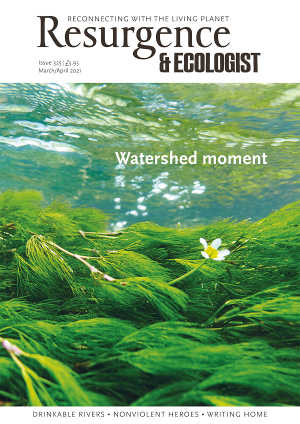As a farmer’s daughter, I am realistic about growing food. Even with modern machinery, it is always full-on, with gruelling, repetitive work. Dad didn’t ever come on holiday and he couldn’t stop harvesting for my summer birthday. It is nerve-racking too: all that year-round labour and expense can be wasted with just one heavy storm flattening a crop, or a few weeks of drought killing a carefully nurtured field. Rural idyll is a hard, dangerous gig, with an elevated risk of injury and high suicide rates.
I brought this scepticism and realism to Chris Smaje’s book A Small Farm Future. Surely a future of small farms would be one of endless graft, uncertain rewards and no space for holidays, celebrating or culture?
But then I only have to cast my mind back a few months, and there we all were, standing in front of empty supermarket shelves and feeling utterly hopeless about how we would put decent meals on the table in a pandemic. Meanwhile, because the supply chain had faltered, millions of tonnes of food went to waste. There were no holidays, celebrating or pleasure then. When it comes down to it, food security is fundamental to everything. In certain situations, our current system, focused on cheap, processed food, is not working.
Modern food production often fails our environment too. An industry reliant on fossil fuels, imports and maximising yields leads to biodiversity loss, climate chaos, desertification and water pollution. And still the holy grail of ‘food for all’ is not found. Malnutrition and hunger persist across the world and in parts of even the wealthiest countries.
The key questions that Smaje addresses in A Small Farm Future are, what would a truly resilient society look like? How would it work with our planet’s ecology to establish a deeply sustainable future?
His answer is to have more people working in agriculture or horticulture on small farms, serving local markets – predominantly their own households. Establishing a low carbon footprint would be key. It is a system that would not have faltered in the face of a pandemic.
Smaje is a social scientist and anthropologist by training and is well accustomed to examining aspects of social policy, social identities and the environment. For the last 15 years, he has been wellies-on, practising what he preaches, as a co-worker on a small farm in Somerset, south-west England. He brings a multidisciplinary approach that explores many different pathways, beyond the merely utopian, for achieving a more sustainable future.
This book is not an easy read, but it is well written. Maybe I’ve sought too many lazy books recently, but this isn’t one to pick up at bedtime. It is intellectual, rigorous and thought-provoking: a book to switch your brain on, not numb it.
Do not be put off by the initial gloom as the author details our depressing mess-ups in stark terms, defining them as ‘crises’ and ‘wicked problems’ and pointing out the inevitability of ‘trade-offs’ in life. It is only by recognising the scale of the problem that we can move forward. Thankfully Smaje takes us by the hand and leads us on, answering our questions – such as “Is there enough land?” – past all this carnage, to something hopeful and indeed beautiful.
We’ve sleepwalked our way into the current global crisis. There will be more to come unless we address many of the problems flagged up in this book. I am still sceptical about the practical application of Smaje’s solutions in our modern world, but this creative thinking and debate are essential.






